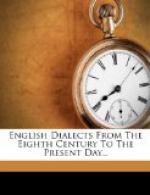A good example of a dialect word is gantry or gauntree, a wooden stand for barrels, known in varying forms in many dialects. It is rightly derived, in the E.D.D., from gantier, which must have been an A.F. (Anglo-French) form, though now only preserved in the Rouchi dialect, spoken on the borders of France and Belgium, and nearly allied to Norman; in fact, M. Hecart, the author of the Dictionnaire Rouchi-Fran{c,}ais, says he had heard the word in Normandy, and he gives a quotation for it from Olivier Basselin, a poet who lived in Normandy at the beginning of the fifteenth century. The Parisian form is chantier, which Cotgrave explains as “a Gauntrey... for hogs-heads to stand on.” Here is a clear example of a word which is of Norman, or A.F., origin; and there must be many more such of which the A.F. form is lost. There is no greater literary disgrace to England than the fact that there is no reasonable Dictionary in existence of Anglo-French, though it contains hundreds of highly important legal terms. It ought, in fact, to have been compiled before either the English Dialect Dictionary or the New English Dictionary, both of which have suffered from the lack of it.
It would indeed be tedious to enumerate the vast number of French words in our dialects. Many are literary words used in a peculiar sense, often in one that has otherwise been long obsolete; such as able, rich; access, an ague-fit; according, comparatively; to act, to show off, be ridiculous; afraid, conj., for fear that; agreeable, willing; aim, to intend; aisle, a central thoroughfare in a shop, etc.; alley, the aisle of a church; allow, to suppose; anatomy, a skeleton; ancient, an ensign, flag; anguish, inflammation; annoyance, damage; anointed, notoriously vicious; apron, the diaphragm of an animal; apt, sure; arbitrary, impatient of restraint; archangel, dead nettle; argue, to signify; arrant, downright; auction, an untidy place, a crowd; avise (for advise), to inform. It is needless to go through the rest of the alphabet.
Moreover, dialect-speakers are quite capable of devising new forms for themselves. It is sufficient to instance abundation, abundance; ablins, possibly (made from able); argle, argie-bargie, argle-bargle, argufy, all varieties of the verb to argue; and so on.




